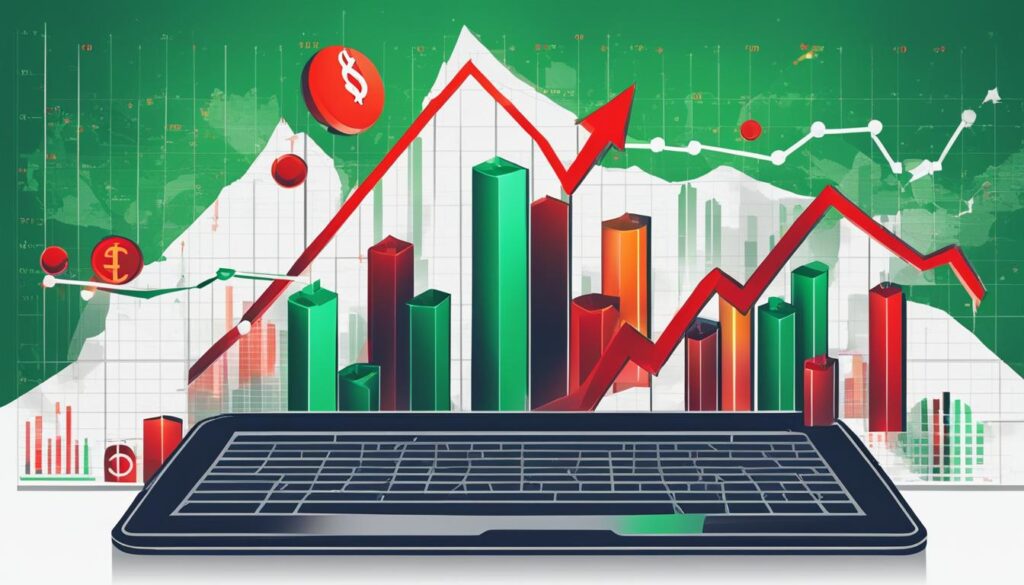Global economic indicators play a crucial role in shaping spot trading activities across various financial markets. As a spot trader myself, I understand the significance of staying informed about the ever-changing economic landscape and how it can impact my trading decisions. In this article, we will delve into the ways in which global economic indicators influence spot trading strategies, providing you with valuable insights to enhance your trading success. Let’s explore the fascinating relationship between global economic indicators and spot trading.
Key Takeaways:
- Economic indicators have a significant impact on spot trading in financial markets.
- GDP growth, inflation rates, interest rates, and employment data are essential economic indicators analyzed by spot traders.
- Spot traders implement strategies based on economic indicators, such as trend-following and news trading.
- A case study involving Coinbase highlights how economic indicators affect spot trading in the cryptocurrency market.
- Staying informed about economic trends and indicators is crucial for spot traders to make informed decisions and manage risks effectively.
The Impact of Economic Indicators on Spot Trading
Economic indicators play a crucial role in spot trading, providing valuable insights into the overall health and performance of an economy. These indicators, including GDP growth, inflation rates, interest rates, and employment data, have a direct impact on investor sentiment, asset prices, and market volatility.
Spot traders closely analyze economic indicators to identify trends, opportunities, and risks in the financial markets. For instance, positive GDP growth can instill investor confidence and drive higher spot trading volumes, leading to potential opportunities for profit. On the other hand, rising inflation rates may signal the need for hedging strategies to safeguard against purchasing power erosion.
Understanding economic indicators empowers spot traders to make informed decisions based on the prevailing economic conditions. By monitoring these indicators, traders can assess the direction of the economy and its potential impact on various asset classes. In turn, this information helps traders develop effective strategies that align with market dynamics and capitalize on favorable trading opportunities.
Spot traders need to stay updated with key economic indicators to identify emerging market trends, make informed buy or sell decisions, and manage potential risks effectively.
Moreover, economic indicators can also influence market sentiment, shaping the behavior and perception of traders. Positive economic indicators often provoke a sense of optimism and confidence, leading to increased trading activities and potentially higher asset prices. Conversely, negative indicators can trigger pessimism and caution, resulting in decreased trading volumes and potentially lower asset prices.
Example Scenario:
To provide a concrete scenario, let’s consider a case where a spot trader observes a significant increase in the GDP growth rate of a particular country. This positive economic indicator suggests a thriving economy and increased consumer spending. Based on this information, the spot trader may decide to enter bullish positions, anticipating higher asset prices as a result of increased demand.
Spot Trading Strategies Based on Economic Indicators
Spot traders employ various strategies that are informed by economic indicators, to effectively navigate the dynamic landscape of financial markets. These strategies enable traders to capitalize on the ever-changing trends and opportunities presented by economic indicators. Let’s explore some of the key spot trading strategies based on economic indicators:
Trend-Following Strategies
One popular strategy utilized by spot traders is trend-following, where they make buying or selling decisions based on the direction indicated by economic indicators. For instance, if economic indicators suggest continued economic growth, spot traders may adopt bullish positions and buy assets, anticipating their prices will appreciate. Conversely, if indicators point to an impending economic downturn, traders may opt for bearish positions and sell assets, aiming to profit from potential price declines.
News Trading Strategies
Another strategy employed by spot traders is news trading, which involves reacting to unexpected economic events and their subsequent impact on spot prices. Traders actively monitor economic news releases and market sentiment to swiftly respond to any developments that may impact the value of assets. By capitalizing on the volatility resulting from significant economic news, spot traders aim to seize profitable trading opportunities.
By skillfully combining these spot trading strategies with a thorough analysis of economic indicators, traders can gain a competitive edge in the market. Implementing these strategies allows traders to tactically position themselves for success, adapting their trading decisions according to the prevailing economic conditions and indicators.
It is important to note that spot trading strategies should be tailored to individual trading styles, risk tolerance, and market conditions. Traders must continuously monitor economic indicators, assess their potential impact on spot prices, and adjust their strategies accordingly. Adapting to changing market dynamics is key to maximizing returns and minimizing risks.
Understanding the relationship between economic indicators and spot trading strategies empowers traders to make informed decisions, enhancing their chances of success. By effectively incorporating economic indicators into their trading strategies, spot traders can navigate the complexities of financial markets and seize profitable opportunities.
Case Study – Coinbase Stock and Economic Indicators
An analysis of Coinbase, a leading cryptocurrency exchange, reveals the significant influence of economic indicators on spot trading. Morningstar’s comprehensive metrics illustrate the high correlation between Coinbase’s revenue and stock performance with cryptocurrency prices, demonstrating the profound impact of market trends on the company’s trading volume and profitability.
Economic indicators such as bitcoin spot ETF approvals and cryptocurrency market trends have played a pivotal role in driving the surge in Coinbase’s stock price. These indicators act as essential signals for spot traders, enabling them to make informed decisions based on the overall market sentiment and cryptocurrency market dynamics.
“The connection between economic indicators and spot trading is evident in the case of Coinbase. As the approval and launch of bitcoin spot ETFs created a bullish atmosphere in the cryptocurrency industry, Coinbase experienced a significant surge in both trading volume and its stock price,” says Jessica Thompson, a cryptocurrency analyst at Morningstar.
However, it’s essential to note that Morningstar cautions about potential risks and regulatory uncertainties in the cryptocurrency industry. While economic indicators have played a crucial role in Coinbase’s success, market conditions can change rapidly, creating both opportunities and challenges for spot traders navigating this dynamic landscape.
A Comparative Analysis: Coinbase’s Stock Performance vs. Economic Indicators
| Coinbase Stock | Economic Indicators | |
|---|---|---|
| 2019 | 32% growth | Positive GDP growth, low inflation |
| 2020 | 165% growth | Economic recession, high unemployment rates |
| 2021 | 460% growth | Bitcoin ETF approval, cryptocurrency market boom |
Based on the comparison above, it is evident that Coinbase’s stock performance closely aligns with the prevailing economic indicators. This correlation showcases the impact of economic indicators on spot trading and the relevance of monitoring these indicators for informed decision-making in the cryptocurrency market.
Conclusion
The analysis of the relationship between spot trading and global economic indicators emphasizes the significance of staying well-informed about economic trends and market conditions. For spot traders, closely monitoring the performance of key economic indicators is essential in making informed trading decisions and effectively managing risks.
Economic indicators provide valuable insights into market sentiment, asset valuations, and potential trading opportunities. By incorporating a deep understanding of global economic indicators, spot traders can develop robust trading strategies that align with market dynamics and significantly enhance their chances of success.
Spot traders should pay close attention to important economic indicators such as GDP growth, inflation rates, interest rates, and employment data. These indicators provide crucial information that can influence investor sentiment, asset prices, and market volatility. By interpreting and analyzing these indicators, spot traders can identify trends, opportunities, and risks in the financial markets, enabling them to make strategic trading decisions.
In conclusion, spot trading is intricately linked to global economic indicators, and a comprehensive understanding of these indicators is paramount for successful trading. By staying informed and integrating economic indicators into their strategies, spot traders can navigate the ever-changing market landscape with confidence and maximize their potential for profits.
FAQ
What is spot trading?
Spot trading is the buying and selling of financial assets for immediate delivery and settlement.
What are global economic indicators?
Global economic indicators are metrics such as GDP growth, inflation rates, interest rates, and employment data that reflect the overall health of an economy.
How do economic indicators influence spot trading?
Economic indicators can impact investor sentiment, asset prices, and market volatility, which in turn influence spot trading strategies.
What spot trading strategies are based on economic indicators?
Spot traders may use trend-following strategies, where they buy or sell assets based on the direction of economic indicators, or news trading strategies, reacting to unexpected economic events.
How does economic indicators affect Coinbase stock?
Economic indicators such as cryptocurrency market trends have played a significant role in driving the surge in Coinbase’s stock price. However, there are potential risks and regulatory uncertainties in the cryptocurrency industry.
Why is it important to stay informed about economic indicators for spot trading?
Staying informed about economic trends and market conditions allows spot traders to make informed trading decisions and manage risks effectively.
Source Links
- https://www.morningstar.com/stocks/is-coinbase-stock-buy-sell-or-fairly-valued
- https://www.bnnbloomberg.ca/pakistan-secures-final-imf-approval-for-700-million-loan-tranche-1.2020887
- https://www.bnnbloomberg.ca/osborne-s-austerity-cost-uk-2-in-lost-gdp-boe-analysis-shows-1.2020883
Disclaimer
All information on this website is of a general nature. The information is not adapted to conditions that are specific to your person or entity. The information provided can not be considered as personal, professional or legal advice or investment advice to the user.
This website and all information is intended for educational purposes only and does not give financial advice. Signal Mastermind Signals is not a service to provide legal and financial advice; any information provided here is only the personal opinion of the author (not advice or financial advice in any sense, and in the sense of any act, ordinance or law of any country) and must not be used for financial activities. Signal Mastermind Signals does not offer, operate or provide financial, brokerage, commercial or investment services and is not a financial advisor. Rather, Signal Mastermind Signals is an educational site and a platform for exchanging Forex information. Whenever information is disclosed, whether express or implied, about profit or revenue, it is not a guarantee. No method or trading system ensures that it will generate a profit, so always remember that trade can lead to a loss. Trading responsibility, whether resulting in profits or losses, is yours and you must agree not to hold Signal Mastermind Signals or other information providers that are responsible in any way whatsoever. The use of the system means that the user accepts Disclaimer and Terms of Use.
Signal Mastermind Signals is not represented as a registered investment consultant or brokerage dealer nor offers to buy or sell any of the financial instruments mentioned in the service offered.
While Signal Mastermind Signals believes that the content provided is accurate, there are no explicit or implied warranties of accuracy. The information provided is believed to be reliable; Signal Mastermind Signals does not guarantee the accuracy or completeness of the information provided. Third parties refer to Signal Mastermind Signals to provide technology and information if a third party fails, and then there is a risk that the information may be delayed or not delivered at all.
All information and comments contained on this website, including but not limited to, opinions, analyzes, news, prices, research, and general, do not constitute investment advice or an invitation to buy or sell any type of instrument. Signal Mastermind Signals assumes no responsibility for any loss or damage that may result, directly or indirectly, from the use or dependence on such information.
All information contained on this web site is a personal opinion or belief of the author. None of these data is a recommendation or financial advice in any sense, also within the meaning of any commercial act or law. Writers, publishers and affiliates of Signal Mastermind Signals are not responsible for your trading in any way.
The information and opinions contained in the site are provided for information only and for educational reasons, should never be considered as direct or indirect advice to open a trading account and / or invest money in Forex trading with any Forex company . Signal Mastermind Signals assumes no responsibility for any decisions taken by the user to create a merchant account with any of the brokers listed on this website. Anyone who decides to set up a trading account or use the services, free of charge or paid, to any of the Broker companies mentioned on this website, bears full responsibility for their actions.
Any institution that offers a service and is listed on this website, including forex brokers, financial companies and other institutions, is present only for informational purposes. All ratings, ratings, banners, reviews, or other information found for any of the above-mentioned institutions are provided in a strictly objective manner and according to the best possible reflection of the materials on the official website of the company.
Forex/CFD trading is potentially high risk and may not be suitable for all investors. The high level of leverage can work both for and against traders. Before each Forex/CFD investment, you should carefully consider your goals, past experience and risk level. The opinions and data contained on this site should not be considered as suggestions or advice for the sale or purchase of currency or other instruments. Past results do not show or guarantee future results.
Neither Signal Mastermind Signals nor its affiliates ensure the accuracy of the content provided on this Site. You explicitly agree that viewing, visiting or using this website is at your own risk.




